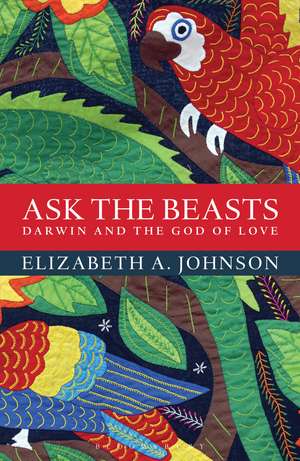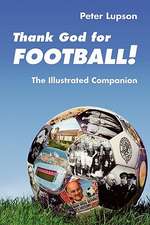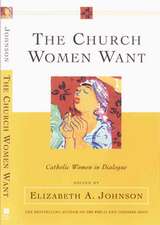Ask the Beasts: Darwin and the God of Love
Autor Elizabeth A. Johnsonen Limba Engleză Paperback – 12 aug 2015
Preț: 77.66 lei
Preț vechi: 125.16 lei
-38% Nou
Puncte Express: 116
Preț estimativ în valută:
14.86€ • 15.48$ • 12.30£
14.86€ • 15.48$ • 12.30£
Carte disponibilă
Livrare economică 13-27 martie
Livrare express 27 februarie-05 martie pentru 72.44 lei
Preluare comenzi: 021 569.72.76
Specificații
ISBN-13: 9781472924018
ISBN-10: 1472924010
Pagini: 352
Dimensiuni: 135 x 216 x 25 mm
Greutate: 0.36 kg
Editura: Bloomsbury Publishing
Colecția Bloomsbury Continuum
Locul publicării:London, United Kingdom
ISBN-10: 1472924010
Pagini: 352
Dimensiuni: 135 x 216 x 25 mm
Greutate: 0.36 kg
Editura: Bloomsbury Publishing
Colecția Bloomsbury Continuum
Locul publicării:London, United Kingdom
Caracteristici
Top US Woman Theologian; Distinguished Professor of Theology at Fordham
Notă biografică
Elizabeth A. Johnson, C.S.J., is distinguished Professor of Theology at Fordham University. She has received numerous awards, including the Louisville Grawemeyer Award in Religion for She Who Is (1993), the American Academy of Religion Award for Excellence in the Study of Religion for Friends of God and Prophets (1999), and the Book Award of the College Theology Society for Truly Our Sister (2004). She was also the recipient of the John Courtney Murray Award of the Catholic Theological Society of America, the Jerome Award of the Catholic Library Association, and the Monika K. Hellwig Award of the Association of Catholic Colleges and Universities.
Cuprins
AcknowledgementsPreface1 Beasts and Entangled Bank: A Dialogue2 "When We Look..."3 "Endless Forms Most Beautiful"4 Evolution of the Theroy5 The Dwelling Place of God6 Free, Empowered Creation7 All Creation Groaning8 Bearer of Great Promise9 Enter the Humans10 The Community of CreationNotesSelected BibliographyIndex
Recenzii
In Ask the Beasts Elisabeth Johnson combines erudition and theological reflection, a pastoral passion and ethical commitment to show that Darwinian theory of evolution need not stand against a religious belief in God. Instead, she provides a theology of creation that not only integrates an understanding of evolution with a belief in the presence of God's love and grace in the world, but also encourages us to take up our common responsibility for the earth, its environment, and all its living creatures. The clarity of her exposition and her ability to bring classical theological affirmations to bear on contemporary issues makes this book an accessible and required reading on the burning issues of faith, science, and ecological well-being.
Elizabeth Johnson's beautifully written book shows us, more convincingly than any other book that I have ever read, how science and religion can engage in a dialogue which is mutually illuminating. She shows how the narratives of evolution and salvation are not just parallel stories but shed light on each other. The unpredictable creativity of matter is disclosed as the sphere of the working of the ever-fresh Holy Spirit. She brings us to a new understanding of the role of pain and death, and radically deepens our understanding of a cosmic redemption. I will read the Bible with a renewed understanding and pleasure. I have rarely enjoyed a book of theology more.
This book is a call to broaden our focus, beyond the hierarchy we have perceived in Genesis, beyond the individualistic angst of human sin and redemption. It shows us that biblical revelation is bigger than this - God is bigger than this.
Johnson's work is vivifying, encouraging not only Christian thoughtfulness but also reverence toward the ecosystem on its behalf. An overdue reconciliation of religious belief to scientific cognizance, Ask the Beasts should become the benchmark for conversations between the disciplines.
With Ask the Beasts Elizabeth Johnson gives us a gift of the insights, scope of vision and impact of Darwin's theory on the way we humans view the history of life on our planet and our responsibility to care for our home.
In constructing her "dialogue between Charles Darwin's account of the origin of species and the Christian story of the ineffable God of mercy and love recounted in the Nicene Creed" (xv), Johnson writes so skillfully in her judicious use of a broad swathe of traditional and contemporary literature, and also so beautifully, that this book may well stand out as one of the most important to come from the early twenty-first century.
Like Darwin marveling at the web of life observed in the tangle of vegetation, insects, birds, and animals along a riverbank and at discovering the 'grandeur' of a view of life that is dynamic rather than static, Johnson's stance is most often one of profound wonder at the complexity, beauty and mystery of creation and of its Creator.
Elizabeth Johnson's most recent publication demonstrates not only her facility and keen insight on matters of theology, but also her knowledge of evolutionary theory as introduced by Darwin and updated by other scholars. Johnson is a clear and persuasive writer who substantiates her work with footnotes and an eleven-page select bibliography. . Ask the Beasts forwards the conversation between science and theology and is well-suited for any library, but particularly for a theological library.
Johnson makes the world sing through the pages of her book ... Ask the Beasts provides a blueprint for a new theology of Creation, in fact, a new ecological theology. Others have been working towards this for some time, but none more persuasively or more beautifully than Elizabeth Johnson.
This Spirit-imbued vision of creation yields the kind of strong ecological ethic demanded in our day. . Ask the Beasts presents a deeply sacramental, incarnational view of the natural world and our place in it.
What might have been a book review of Ask the Beasts: Darwin and the God of Love ... has becomethat and something more because of the quality of the book and the contemporary relevance of the issues with which it deals. Indeed, those issues are not only central to Christian faith and life, but also concern the threat that we humans now pose for all life on the planet ... It is the fruit of careful and detailed study, dialogue, tested judgements and conclusions across fields not commonly traversed by a theologian. It bears the mark of the deep and careful reflection of an accomplished theologian.
Elizabeth Johnson's beautifully written book shows us, more convincingly than any other book that I have ever read, how science and religion can engage in a dialogue which is mutually illuminating. She shows how the narratives of evolution and salvation are not just parallel stories but shed light on each other. The unpredictable creativity of matter is disclosed as the sphere of the working of the ever-fresh Holy Spirit. She brings us to a new understanding of the role of pain and death, and radically deepens our understanding of a cosmic redemption. I will read the Bible with a renewed understanding and pleasure. I have rarely enjoyed a book of theology more.
This book is a call to broaden our focus, beyond the hierarchy we have perceived in Genesis, beyond the individualistic angst of human sin and redemption. It shows us that biblical revelation is bigger than this - God is bigger than this.
Johnson's work is vivifying, encouraging not only Christian thoughtfulness but also reverence toward the ecosystem on its behalf. An overdue reconciliation of religious belief to scientific cognizance, Ask the Beasts should become the benchmark for conversations between the disciplines.
With Ask the Beasts Elizabeth Johnson gives us a gift of the insights, scope of vision and impact of Darwin's theory on the way we humans view the history of life on our planet and our responsibility to care for our home.
In constructing her "dialogue between Charles Darwin's account of the origin of species and the Christian story of the ineffable God of mercy and love recounted in the Nicene Creed" (xv), Johnson writes so skillfully in her judicious use of a broad swathe of traditional and contemporary literature, and also so beautifully, that this book may well stand out as one of the most important to come from the early twenty-first century.
Like Darwin marveling at the web of life observed in the tangle of vegetation, insects, birds, and animals along a riverbank and at discovering the 'grandeur' of a view of life that is dynamic rather than static, Johnson's stance is most often one of profound wonder at the complexity, beauty and mystery of creation and of its Creator.
Elizabeth Johnson's most recent publication demonstrates not only her facility and keen insight on matters of theology, but also her knowledge of evolutionary theory as introduced by Darwin and updated by other scholars. Johnson is a clear and persuasive writer who substantiates her work with footnotes and an eleven-page select bibliography. . Ask the Beasts forwards the conversation between science and theology and is well-suited for any library, but particularly for a theological library.
Johnson makes the world sing through the pages of her book ... Ask the Beasts provides a blueprint for a new theology of Creation, in fact, a new ecological theology. Others have been working towards this for some time, but none more persuasively or more beautifully than Elizabeth Johnson.
This Spirit-imbued vision of creation yields the kind of strong ecological ethic demanded in our day. . Ask the Beasts presents a deeply sacramental, incarnational view of the natural world and our place in it.
What might have been a book review of Ask the Beasts: Darwin and the God of Love ... has becomethat and something more because of the quality of the book and the contemporary relevance of the issues with which it deals. Indeed, those issues are not only central to Christian faith and life, but also concern the threat that we humans now pose for all life on the planet ... It is the fruit of careful and detailed study, dialogue, tested judgements and conclusions across fields not commonly traversed by a theologian. It bears the mark of the deep and careful reflection of an accomplished theologian.







